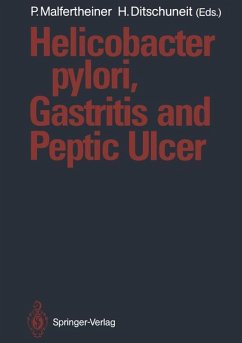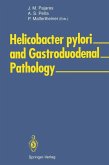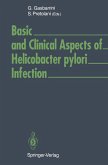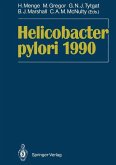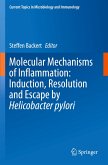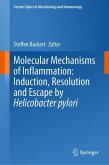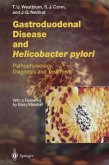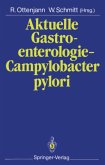Helicobacter pylori, Gastritis and Peptic Ulcer
Herausgegeben:Malfertheiner, Peter; Ditschuneit, Hans
Helicobacter pylori, Gastritis and Peptic Ulcer
Herausgegeben:Malfertheiner, Peter; Ditschuneit, Hans
- Broschiertes Buch
- Merkliste
- Auf die Merkliste
- Bewerten Bewerten
- Teilen
- Produkt teilen
- Produkterinnerung
- Produkterinnerung
Helieobaeter pylori has recently been recognized as a new genus according to specific taxonomic criteria; the "popular" name Campylobaeter pylori has been corrected by scientific progress. Following the discovery of the spiral microorgan ism in gastric mucosa by Marshall and Warren in 1982, it took only a few years for H. pylori to become established as a factor in the pathogenesis of gastritis and peptic ulcer disease. Interest in different aspects of H. pylori has grown continuously and has attracted scientists from various medical and biological disciplines such as gastroenterology,…mehr
Andere Kunden interessierten sich auch für
![Helicobacter pylori and Gastroduodenal Pathology Helicobacter pylori and Gastroduodenal Pathology]() Helicobacter pylori and Gastroduodenal Pathology83,99 €
Helicobacter pylori and Gastroduodenal Pathology83,99 €![Basic and Clinical Aspects of Helicobacter pylori Infection Basic and Clinical Aspects of Helicobacter pylori Infection]() Basic and Clinical Aspects of Helicobacter pylori Infection74,99 €
Basic and Clinical Aspects of Helicobacter pylori Infection74,99 €![Helicobacter pylori 1990 Helicobacter pylori 1990]() Helicobacter pylori 199074,99 €
Helicobacter pylori 199074,99 €![Molecular Mechanisms of Inflammation: Induction, Resolution and Escape by Helicobacter pylori Molecular Mechanisms of Inflammation: Induction, Resolution and Escape by Helicobacter pylori]() Molecular Mechanisms of Inflammation: Induction, Resolution and Escape by Helicobacter pylori125,99 €
Molecular Mechanisms of Inflammation: Induction, Resolution and Escape by Helicobacter pylori125,99 €![Molecular Mechanisms of Inflammation: Induction, Resolution and Escape by Helicobacter pylori Molecular Mechanisms of Inflammation: Induction, Resolution and Escape by Helicobacter pylori]() Molecular Mechanisms of Inflammation: Induction, Resolution and Escape by Helicobacter pylori125,99 €
Molecular Mechanisms of Inflammation: Induction, Resolution and Escape by Helicobacter pylori125,99 €![Gastroduodenal Disease and Helicobacter pylori Gastroduodenal Disease and Helicobacter pylori]() Gastroduodenal Disease and Helicobacter pylori74,99 €
Gastroduodenal Disease and Helicobacter pylori74,99 €![Aktuelle Gastroenterologie ¿ Campylobacter pylori Aktuelle Gastroenterologie ¿ Campylobacter pylori]() Aktuelle Gastroenterologie ¿ Campylobacter pylori54,99 €
Aktuelle Gastroenterologie ¿ Campylobacter pylori54,99 €-
-
-
Helieobaeter pylori has recently been recognized as a new genus according to specific taxonomic criteria; the "popular" name Campylobaeter pylori has been corrected by scientific progress. Following the discovery of the spiral microorgan ism in gastric mucosa by Marshall and Warren in 1982, it took only a few years for H. pylori to become established as a factor in the pathogenesis of gastritis and peptic ulcer disease. Interest in different aspects of H. pylori has grown continuously and has attracted scientists from various medical and biological disciplines such as gastroenterology, microbiology, pathology, immunology, and pharmacology. Indeed H. pylori provides an excellent model for interdisciplinary interaction and cooperation. To promote this concept of interdisciplinary research and exchange of knowledge, a European Campylobacter (Helicobacter) Pylori Study Group was founded in 1987 in Copenhagen. The second meeting of this expanding group was held from October 12-14,1989in Ulm, FRG. The fact that more than 500 participants attended the conference and that 187 original contributions from all five continents were presented clearly confirmed that H. pylori has "scientifically infected" the whole world. Our understanding of the microbiological and pathogenetic aspects of H. pylori is continuously being challenged as new results follow swifthy from different research areas. This book includes an update and progress report on the various aspects of H. pylori presented and discussed in special workshops held during the meeting in Ulm.
Hinweis: Dieser Artikel kann nur an eine deutsche Lieferadresse ausgeliefert werden.
Hinweis: Dieser Artikel kann nur an eine deutsche Lieferadresse ausgeliefert werden.
Produktdetails
- Produktdetails
- Verlag: Springer / Springer Berlin Heidelberg / Springer, Berlin
- Artikelnr. des Verlages: 978-3-642-75317-6
- Softcover reprint of the original 1st ed. 1990
- Seitenzahl: 496
- Erscheinungstermin: 29. Dezember 2011
- Englisch
- Abmessung: 242mm x 170mm x 27mm
- Gewicht: 841g
- ISBN-13: 9783642753176
- ISBN-10: 3642753175
- Artikelnr.: 36122211
- Herstellerkennzeichnung Die Herstellerinformationen sind derzeit nicht verfügbar.
- Verlag: Springer / Springer Berlin Heidelberg / Springer, Berlin
- Artikelnr. des Verlages: 978-3-642-75317-6
- Softcover reprint of the original 1st ed. 1990
- Seitenzahl: 496
- Erscheinungstermin: 29. Dezember 2011
- Englisch
- Abmessung: 242mm x 170mm x 27mm
- Gewicht: 841g
- ISBN-13: 9783642753176
- ISBN-10: 3642753175
- Artikelnr.: 36122211
- Herstellerkennzeichnung Die Herstellerinformationen sind derzeit nicht verfügbar.
Helicobacter pylori - Taxonomy and Biology.- Taxonomy of Helicobacter pylori and Related Bacteria.- Helicobacter pylori: Microbiological Aspects.- Development of Genetic and Molecular Approaches for the Diagnosis and Study of the Pathogenesis of Helicobacter pylori.- Assessment of DNA and Protein Molecular Fingerprinting Methods for Strain Identification of Helicobacter pylori.- The Genesis of Coccal Forms of Helicobacter pylori.- Epidemiology of Helicobacter pylori Infections.- Physiology of Helicobacter pylori.- In Vitro Susceptibility of Helicobacter pylorito Antibiotics and Bismuth Salts and the Importance of Aquired Resistance to Antibiotics in Treatment Failures of H. pylori Infection.- Taxonomy and Biology of Helicobacter pylori-a Comment.- Pathogenic Mechanisms of Helicobacter pylori.- Virulence Factors of Helicobacter pylori - Ultrastructural Features.- Molecular Cloning and Sequencing of Helicobacter pylori Urease Genes and Detection of H. pylori using the Polymerase Chain Reaction Technique.- The Structure of Helicobacter pylori Urease.- Pathogenic Mechanisms of Helicobacter pylori: Production of Cytotoxin.- Helicobacter pylori Hemagglutinins - Possible Gut Mucosa Adhesins.- Lectin Typing of Helicobacter pylori.- Association of Helicobacter pylori with Epithelial Cells.- Influence of Helicobacter pylori on Intragastric Environment: Bile Acids and Biliary Lipids.- Animal Models of Helicobacter pylori Gastritis.- The Pathogenic Mechanisms of Helicobacter pylori - a Comment.- Local and Systemic Immune Response.- Methods of Studying the Immune Response.- Serodiagnosis of Helicobacter pyloriInfections: Suitability of Various Antigen Preparations.- Possible Clinical Uses of Serology to Helicobacter pylori.- Evaluation of a Clinical Role for Serology toHelicobacter pylori.- Serum Antibodies to the Vacuolating Toxin Produced by Helicobacter pylori.- Local Immune Responses to Helicobacter pylori Infections.- Molecular Cloning of Immunodominant Antigen Epitopes of Helicobacter pylori for Development of a Specific ELISA to Diagnose H. pylori Infection.- The Effect of Treatment on Circulating Anti-Helicobacter pylori Antibodies - a Two-Year Follow-Up Study.- Local and Systemic Immune Response - a Comment.- Morphological Aspects of Gastritis.- Helicobacter pylori Induced Gastritis in Childhood.- Comparison of Several Methods of Detecting Helicobacter pylori.- Endoscopic and Histologic Aspects of Gastritis.- Correlation Between the Grade of Activity of Type B Gastritis and Synthesis of Glycoproteins.- Immunohistological Patterns of the Local Immune Response in Helicobacter pylori Gastritis.- Risk of Peptic Ulcer in Gastritis.- Differences Between Helicobacter pylori Associated Gastritis in Patients with Duodenal Ulcer, Pyloric Ulcer, Other Gastric Ulcer, and Gastritis Without Ulcer.- Lymphocytic Gastritis.- Exocrine and Endocrine Epithelial Changes in Types A and B Chronic Gastritis.- The Classification of Gastritis.- Morphological Aspects of Gastritis - a Comment.- Helicobacter pylori in Duodenal Ulcer Pathogenesis.- Aetiological Factors in Duodenal Ulcer.- The Histogenesis of Gastric Metaplasia, in Non-specific Duodenitis.- Gastric Metaplasia in Duodenal Mucosa - Key Factor for H. pylori Colonization and Duodenal Ulcer Pathogenesis?.- The Relationship between Gastric Metaplasia and Inflammation in the Duodenum.- Gastroduodenal Motility in Relationship with Peptic Ulcer Pathogenesis and Helicobacter pylori Infection.- Relationship Between Helicobacter pylori and Gastroduodenal Physiology: Acid Secretion andepsinogens.- Helicobacter pylori and Duodenal Ulcer in the Gastrin Link.- Early Relapse Rate After Healing of H. pyloriPositive Duodenal Ulcers.- Gastric Surgery and Helicobacter pylori.- Is H. pylori-Negative Duodenal Ulcer a Separate Disease?.- Helicobacter pylori in the Pathogenesis of Peptic Ulcer - Evidence in Favour.- Helicobacter pylori as a Pathogenetic Factor in Peptic Ulcer -the Argument Against.- Helicobacter pylori in Duodenal Ulcer Pathogenesis- a Comment.- Nonulcer Dyspepsia and Motility.- Is Helicobacter pylori a Cause of Nonulcer Dyspepsia?.- Gastritis and Altered Motility; the Ability of a Mucosal Inflammatory Reaction to Alter Enteric Nerve and Smooth Muscle in the Gut.- Influence of Chronic Antral and Duodenal Inflammation on Motor Disorders.- Therapeutic Approaches.- Why Should We Treat Helicobacter pylori Infection?.- How to Eradicate Helicobacter pylori and Prevent Reinfection.- Drug Resistance in Helicobacter pylori.- If, When, and How to Treat Children?.- The General Chemistry of Bismuth with Relevance to Pharmacy and Medicine.- Safety Profile of Bismuth-Containing Medications.- Is Nonulcer Dyspepsia Improved by Treating Helicobacter pylori Infection?.- Five-Day Triple Therapy and 15-Day Double Therapy on Helicobacter pylori Eradication.- Antibacterial Therapy: Effect on Healing and Relapse of Peptic Ulcer Disease.- Natural History and Long-Term Monitoring of Therapeutic Attempts to Eradicate H. pylori.- Optimal Conditions for the Design of a Clinical Trial in Helicobacter pylori Related Duodenal Ulcération.- Treatment of Helicobacter pylori infection: a Comment.- Perspectives.- Helicobacter pylori - Future Directions in Research.
Helicobacter pylori - Taxonomy and Biology.- Taxonomy of Helicobacter pylori and Related Bacteria.- Helicobacter pylori: Microbiological Aspects.- Development of Genetic and Molecular Approaches for the Diagnosis and Study of the Pathogenesis of Helicobacter pylori.- Assessment of DNA and Protein Molecular Fingerprinting Methods for Strain Identification of Helicobacter pylori.- The Genesis of Coccal Forms of Helicobacter pylori.- Epidemiology of Helicobacter pylori Infections.- Physiology of Helicobacter pylori.- In Vitro Susceptibility of Helicobacter pylorito Antibiotics and Bismuth Salts and the Importance of Aquired Resistance to Antibiotics in Treatment Failures of H. pylori Infection.- Taxonomy and Biology of Helicobacter pylori-a Comment.- Pathogenic Mechanisms of Helicobacter pylori.- Virulence Factors of Helicobacter pylori - Ultrastructural Features.- Molecular Cloning and Sequencing of Helicobacter pylori Urease Genes and Detection of H. pylori using the Polymerase Chain Reaction Technique.- The Structure of Helicobacter pylori Urease.- Pathogenic Mechanisms of Helicobacter pylori: Production of Cytotoxin.- Helicobacter pylori Hemagglutinins - Possible Gut Mucosa Adhesins.- Lectin Typing of Helicobacter pylori.- Association of Helicobacter pylori with Epithelial Cells.- Influence of Helicobacter pylori on Intragastric Environment: Bile Acids and Biliary Lipids.- Animal Models of Helicobacter pylori Gastritis.- The Pathogenic Mechanisms of Helicobacter pylori - a Comment.- Local and Systemic Immune Response.- Methods of Studying the Immune Response.- Serodiagnosis of Helicobacter pyloriInfections: Suitability of Various Antigen Preparations.- Possible Clinical Uses of Serology to Helicobacter pylori.- Evaluation of a Clinical Role for Serology toHelicobacter pylori.- Serum Antibodies to the Vacuolating Toxin Produced by Helicobacter pylori.- Local Immune Responses to Helicobacter pylori Infections.- Molecular Cloning of Immunodominant Antigen Epitopes of Helicobacter pylori for Development of a Specific ELISA to Diagnose H. pylori Infection.- The Effect of Treatment on Circulating Anti-Helicobacter pylori Antibodies - a Two-Year Follow-Up Study.- Local and Systemic Immune Response - a Comment.- Morphological Aspects of Gastritis.- Helicobacter pylori Induced Gastritis in Childhood.- Comparison of Several Methods of Detecting Helicobacter pylori.- Endoscopic and Histologic Aspects of Gastritis.- Correlation Between the Grade of Activity of Type B Gastritis and Synthesis of Glycoproteins.- Immunohistological Patterns of the Local Immune Response in Helicobacter pylori Gastritis.- Risk of Peptic Ulcer in Gastritis.- Differences Between Helicobacter pylori Associated Gastritis in Patients with Duodenal Ulcer, Pyloric Ulcer, Other Gastric Ulcer, and Gastritis Without Ulcer.- Lymphocytic Gastritis.- Exocrine and Endocrine Epithelial Changes in Types A and B Chronic Gastritis.- The Classification of Gastritis.- Morphological Aspects of Gastritis - a Comment.- Helicobacter pylori in Duodenal Ulcer Pathogenesis.- Aetiological Factors in Duodenal Ulcer.- The Histogenesis of Gastric Metaplasia, in Non-specific Duodenitis.- Gastric Metaplasia in Duodenal Mucosa - Key Factor for H. pylori Colonization and Duodenal Ulcer Pathogenesis?.- The Relationship between Gastric Metaplasia and Inflammation in the Duodenum.- Gastroduodenal Motility in Relationship with Peptic Ulcer Pathogenesis and Helicobacter pylori Infection.- Relationship Between Helicobacter pylori and Gastroduodenal Physiology: Acid Secretion andepsinogens.- Helicobacter pylori and Duodenal Ulcer in the Gastrin Link.- Early Relapse Rate After Healing of H. pyloriPositive Duodenal Ulcers.- Gastric Surgery and Helicobacter pylori.- Is H. pylori-Negative Duodenal Ulcer a Separate Disease?.- Helicobacter pylori in the Pathogenesis of Peptic Ulcer - Evidence in Favour.- Helicobacter pylori as a Pathogenetic Factor in Peptic Ulcer -the Argument Against.- Helicobacter pylori in Duodenal Ulcer Pathogenesis- a Comment.- Nonulcer Dyspepsia and Motility.- Is Helicobacter pylori a Cause of Nonulcer Dyspepsia?.- Gastritis and Altered Motility; the Ability of a Mucosal Inflammatory Reaction to Alter Enteric Nerve and Smooth Muscle in the Gut.- Influence of Chronic Antral and Duodenal Inflammation on Motor Disorders.- Therapeutic Approaches.- Why Should We Treat Helicobacter pylori Infection?.- How to Eradicate Helicobacter pylori and Prevent Reinfection.- Drug Resistance in Helicobacter pylori.- If, When, and How to Treat Children?.- The General Chemistry of Bismuth with Relevance to Pharmacy and Medicine.- Safety Profile of Bismuth-Containing Medications.- Is Nonulcer Dyspepsia Improved by Treating Helicobacter pylori Infection?.- Five-Day Triple Therapy and 15-Day Double Therapy on Helicobacter pylori Eradication.- Antibacterial Therapy: Effect on Healing and Relapse of Peptic Ulcer Disease.- Natural History and Long-Term Monitoring of Therapeutic Attempts to Eradicate H. pylori.- Optimal Conditions for the Design of a Clinical Trial in Helicobacter pylori Related Duodenal Ulcération.- Treatment of Helicobacter pylori infection: a Comment.- Perspectives.- Helicobacter pylori - Future Directions in Research.

